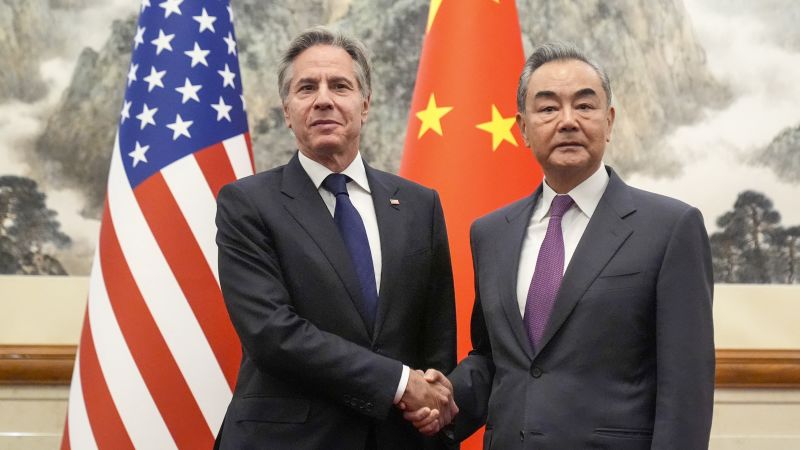Beijing
CNN
—
China and the US face a choice between stability and a “downward spiral,” Chinese Foreign Minister Wang Yi told counterpart Antony Blinken on Friday in Beijing, as the American diplomat kicked off a day of meetings with top Chinese officials.
Blinken’s trip to China – his second in the space of a year – comes as the two global powers seek to expand communication and stabilize rocky ties, while also navigating a host of thorny issues from China’s support for Russia to its aggression in the South China Sea and toward Taiwan.
“Should China and the United States keep to the right direction of moving forward with stability or return to a downward spiral? This is a major question before our two countries, and tests our sincerity and ability,” Wang told Blinken during a meeting at the Diaoyutai State Guesthouse, after saying US-China ties were “beginning to stabilize.”
“Should our two sides lead international cooperation against global issues and achieve win-win for all? Or engage in rivalry and confrontation – or even slide into conflict, which would be a lose-lose for all?” he said, speaking through an interpreter.
Wang’s comments come as Chinese officials bristle at actions Washington has taken in the name of national security, which Beijing sees as meant to suppress its development. Those have included US controls on the export to China of high-tech goods that could have military uses, as well as curbs on US investment in certain high-tech sectors in China.
On Wednesday, US President Joe Biden signed a bill that could lead to a nationwide ban on the social media platform TikTok if the company’s Chinese parent ByteDance doesn’t sell it – legislation Beijing has previously decried.
In his comments to Wang, Blinken pointed to a “shared responsibility” between the two countries to “make sure that we’re as clear as possible about the areas where we have differences, at the very least, to avoid misunderstandings, to avoid miscalculations.”
“I hope we can make some progress on the issues that our presidents agreed we should cooperate on, but also clarify our differences, our intents, and make very clear to each other where we stand,” Blinken said.
The trip is the latest in a string of high-level engagements that included a summit meeting between President Biden and Chinese leader Xi Jinping in California in November, following a period of immense tension.
Officials from both nations suggested ahead of the trip that the visit would be focused on managing the relationship and communicating concerns.
The two sides are also expected to discuss areas of contention.
Blinken is expected to raise the issue of China’s industrial and economic support for Russia, which the White House says has allowed Moscow to continue its war against Ukraine, and press China to use its relationship with Iran to push it to be less provocative in the Middle East.
In a briefing with reporters earlier this week ahead of the meeting, a Chinese Foreign Ministry official said Beijing has been “playing a constructive role as a responsible major country” on issues related to the Middle East, Ukraine, the Korean Peninsula and “expects the US side to do the same.”
In addition to concern about US technology curbs, Wang will likely continue to stress China’s so-called “red lines” in the relationship, the foremost of which being how the US maintains its unofficial relationship with Taiwan.
China’s ruling Communist Party claims Taiwan as part of its territory, despite having never controlled it, and has ramped up its military intimidation of the democratic island in recent years.
“We always call for respecting each other’s core interests and urge the United States not to interfere in China’s internal affairs, not to hold China’s development back, not to step on China’s red lines on China’s sovereignty, security and development interests,” Wang told Blinken ahead of the meeting.

